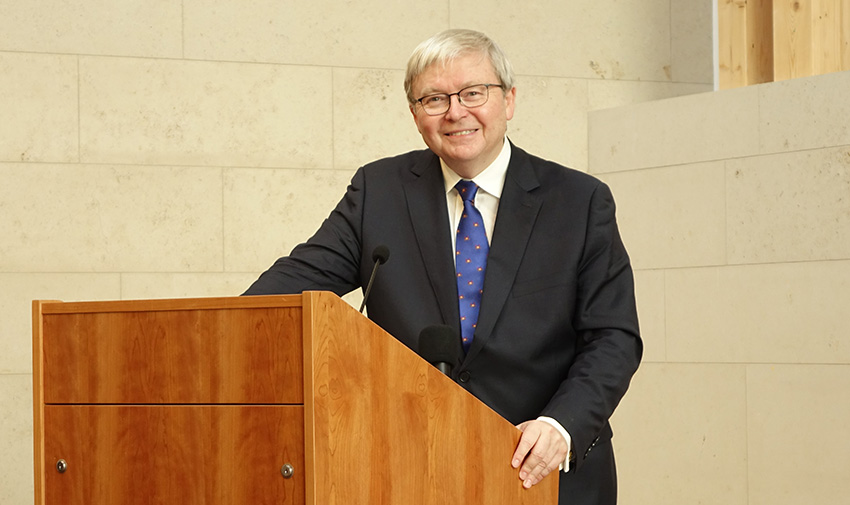Kevin Rudd, former Prime Minister of Australia, visits Exeter College

On 16 May Exeter College was honoured to welcome Kevin Rudd for Trinity Term’s flagship Rector’s Seminar. The former Prime Minister of Australia is currently a DPhil student at Jesus College – Exeter’s traditional rival, the Rector noted during his opening remarks – working on a thesis on the worldview of Chinese President Xi Jinping. We were privileged to hear an insightful talk and question and answer session, informed by Mr Rudd’s many years working in politics combined with his impressive scholarship. He addressed the very pertinent question, ‘How dangerous are current threats to liberal democracy?’ beginning with a brief history of the idea and practice of democracy before identifying five ‘cancers’ which he believes currently threaten it.
Democracy as we know it is a relatively new concept: the Athenian polis was a patriarchal oligarchy, as were the Dutch and Venetian republics centuries later. In Britain women only got the vote a century ago – and even then with limits. With these observations in mind, Mr Rudd suggested that the idea of democracy, although in its current form relatively young, is the fruit of centuries of developing awareness of the ‘intrinsic worth of the human being.’ However, events such as the Reign of Terror during the French Revolution and more recently the Arab Winter that followed the Arab Spring make clear how democratic change and idealism do not necessarily lead to peace, prosperity or even democracy: democracy is hard won and cannot ever be taken for granted. Mr Rudd also noted that Asia did not take the same democratic path as the West at the end of the 19th and beginning of the 20th centuries, and although several Asian countries such as Japan, South Korea, Indonesia, and Malaysia are now democracies, they have typically only been so for a few decades. The complex origins and relative infancy of democracy as a system of government make it imperative that we do not casually dismiss it as a ‘21st century luxury,’ and instead do our utmost to defend it.
Mr Rudd then discussed the five ‘cancers’ which he feels threaten modern democracy, especially in America. Two of these he grouped together as ‘structural cancers’: unrestricted campaign financing and gerrymandering. The first, he argued, places ‘democracy for sale’, while the second distorts electoral maps to create safe districts that parties can be assured of holding easily. Swing voters are deprived of a voice or impact in the electoral process, with some 85% of US electoral districts now considered safe Republican or Democrat strongholds. Furthermore, in these districts hard-line activists – such as those from the Tea Party movement – can take control of the party apparatus, causing bipartisanship to break down.
The third ‘cancer’ concerns the increasing disregard for objective truth. Policy proposals, Mr Rudd said, ought to be based on empirical evidence of their effects. He accepted that facts and opinion can – and should – be debated. However, he held that politicians such as President Trump had made ‘fact and opinion constitute one part of the same reality’ and through ‘alternative facts’ launched a war on objective truth, and detached policy decisions from evidence. In place of evidence-based policy, Mr Rudd argued, we are seeing ‘the globalisation of superficiality’ by elected officials who thrive by being entertaining or outrageous rather than pragmatic. This is dangerous when a serious mindset and considered policies are needed to tackle long-term problems such as climate change.
Clearly issues of such magnitude need mature and civil discussion, but here Mr Rudd identified a fourth ‘cancer,’ the decline of a public commons. Instead of a real public platform, he argued, we find a concentration of media power and influence. As an example, he pointed to the UK where Rupert Murdoch, coupled with populistic politicians such as Boris Johnson, influenced public opinion during the 2016 referendum campaign. In Mr Rudd’s eyes the Murdoch press became a mouthpiece of the Leave campaign, resulting in not only a skewed debate but an echo chamber of opinions replacing a genuine common public platform.
The final ‘cancer’ identified was the ‘fracturing of the socioeconomic contract,’ leading to a growing proportion of the population feeling alienated and powerless. When the hope created by politicians and political campaigns turns to disappointment, frustration and anger, support increases for demagogues who promise to stand up for the ordinary person – as seen in the 2016 US election. What will happen, Mr Rudd asked, if this contract is not repaired, noting that much of the violence of the French Revolution came from those who felt they had no stake in the system.
Mr Rudd then offered several suggestions for us to reflect upon. His main exhortation to us was our duty to ‘reconstitute a new faith in democracy,’ noting that some 40% of American under-35s would be happy to try alternative forms of government. Potential ways of doing this include breaking up media monopolies and encouraging debate. He asked us to rebuild the ‘social contract’ by making it as ‘radical’ and fresh today as it was when first proposed centuries ago. In doing so, he concluded what was an academic talk, yet one interspersed with humour; a warning from history, yet one providing hope for the future by inspiring us to ‘be the change we wish to see in the world.’
Those who were unable to attend the talk can listen to it by clicking here or using the audio player below.
